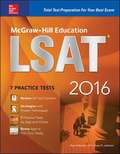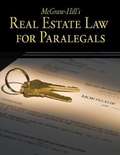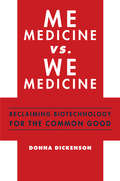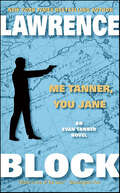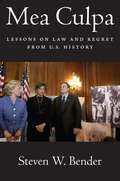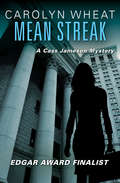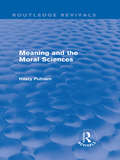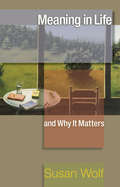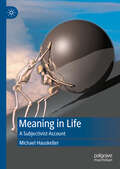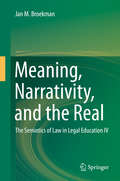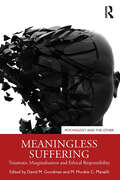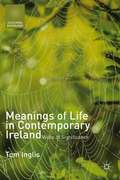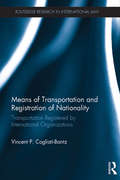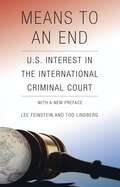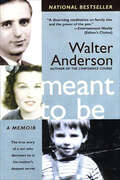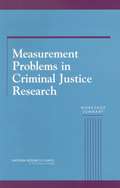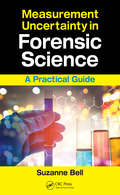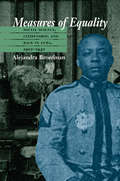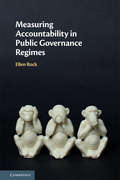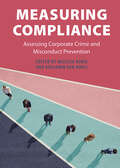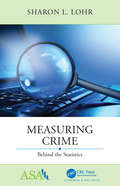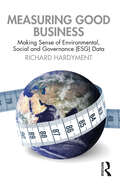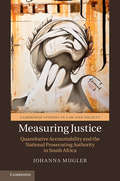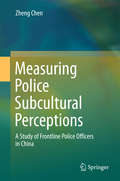- Table View
- List View
McGraw-Hill Education LSAT 2016
by Russ Falconer Drew D. JohnsonMcGraw-Hill Education: LSAT focuses on the fundamental concepts tested on the exam as well as the reasoning and analytical skills necessary to overcome common traps.
Mcgraw-Hill's Real Estate Law for Paralegals
by Lisa Schaffer Andrew WieteckiReal Estate Law for Paralegalspresents students with a clear, easy-to-understand, and exciting text in which they will learn about real property, personal property, and all of the facets inherent in real estate. The text includes a chapter dedicated solely to real estate closings. The students have access to numerous exercises, cases, and hands-on learning assignments (including sample forms) covering topics ranging from "Regulations and Encumbrances" to "Recording Statutes and Examinations. " The Paralegal Supersite Site
Me Medicine vs. We Medicine: Reclaiming Biotechnology for the Common Good
by Donna DickensonPersonalized healthcare—or what the award-winning author Donna Dickenson calls "Me Medicine"—is radically transforming our longstanding "one-size-fits-all" model. Technologies such as direct-to-consumer genetic testing, pharmacogenetically developed therapies in cancer care, private umbilical cord blood banking, and neurocognitive enhancement claim to cater to an individual's specific biological character, and, in some cases, these technologies have shown powerful potential. Yet in others they have produced negligible or even negative results. Whatever is behind the rise of Me Medicine, it isn't just science. So why is Me Medicine rapidly edging out We Medicine, and how has our commitment to our collective health suffered as a result? In her cogent, provocative analysis, Dickenson examines the economic and political factors fueling the Me Medicine phenomenon and explores how, over time, this paradigm shift in how we approach our health might damage our individual and collective well-being. Historically, the measures of "We Medicine," such as vaccination and investment in public-health infrastructure, have radically extended our life spans, and Dickenson argues we've lost sight of that truth in our enthusiasm for "Me Medicine." Dickenson explores how personalized medicine illustrates capitalism's protean capacity for creating new products and markets where none existed before—and how this, rather than scientific plausibility, goes a long way toward explaining private umbilical cord blood banks and retail genetics. Drawing on the latest findings from leading scientists, social scientists, and political analysts, she critically examines four possible hypotheses driving our Me Medicine moment: a growing sense of threat; a wave of patient narcissism; corporate interests driving new niche markets; and the dominance of personal choice as a cultural value. She concludes with insights from political theory that emphasize a conception of the commons and the steps we can take to restore its value to modern biotechnology.
Me Tanner, You Jane (Evan Tanner)
by Lawrence BlockIt's a jungle out there.Literally. At least for Evan Tanner, eternally sleepless sometime superspy, who finds himself in Africa on the trail of the AWOL ruler of tiny Modonoland. It seems the petty despot's gone missing, and he's taken the state treasury along with him.No stranger to impossible missions and international peril, Tanner's been in over his head before. This time, however, he's in imminent danger of being buried alive. And it all has to do with the CIA, white supremacists, moderate revolutionaries . . . and a blond jungle bombshell named (no joke!) Sheena. Tanner's always been a sucker for a pretty face and a curvaceous body, especially one that's wrapped in leopard skin. But this red hot renegade daughter of a local missionary is a maneater.Which means this time Tanner's goose is well and truly cooked.
Mea Culpa: Lessons on Law and Regret from U.S. History
by Steven W. BenderIn Mea Culpa, Steven W. Bender examines how the United States’ collective shame about its past has shaped the evolution of law and behavior. We regret slavery and segregationist Jim Crow laws. We eventually apologize, while ignoring other oppressions, and our legal response to regret often fails to be transformative for the affected groups. By examining policies and practices that have affected the lives ofgroups that have been historically marginalized and oppressed, Bender is able to draw persuasive connections between shame and its eventual legalmanifestations. Analyzing the United States’ historical response to its own atrocities, Bender identifies and develops a definitive moral compass thatguides us away from the policies and practices that lead to societal regret.Mea Culpa challenges its readers. In a different era, might we have been slave owners or proprietors of a racially segregated establishment? It’s easy to judge immorality in the hindsight of history, but what current practices and policies will later generations regret?More than a historical survey, this volume offers a framework for resolving some of the most contentious socialproblems of our time. Drawing on his background as a legal scholar, Bender tackles immigration, the death penalty, the war on terror, reproductive rights,welfare, wage inequity, homelessness, mass incarceration, and same-sex marriage. Ultimately, he argues, it is the dehumanization of human beings thatallows for practices to occur that will later be marked as regrettable. And all of us have a stake in standing on the side of history that resists dehumanization.
Mean Streak (The Cass Jameson Mysteries #4)
by Carolyn WheatIn the highest-profile case of her career, Cass defends her ex-lover in federal court in this Edgar Award–nominated legal thriller It&’s hard not to be charmed by Matt Riordan. Ruggedly handsome, with a sharp wit and a voice like Belgian chocolate, he could woo any jury. His clients may be mobsters, but Riordan never seems to have any trouble winning sympathy for them. That charisma worked on Cass Jameson, too, even though she should have been smart enough to know better. A hard-boiled defense attorney who&’s made a living going toe to toe with the meanest bastards in Brooklyn, Cass nevertheless fell for the Riordan charm—right until he broke her heart. Not long after Riordan runs out on her, Cass sees his smiling face on the cover of New York magazine. The most powerful defense attorney in New York has been accused of taking bribes, and he needs Cass to keep him out of jail. When one of Riordan&’s most vicious clients gets involved in the case, a smile won&’t be enough to keep him alive.
Meaning and the Moral Sciences (Routledge Revivals)
by Hilary PutnamFirst published in 1978, this reissue presents a seminal philosophical work by professor Putnam, in which he puts forward a conception of knowledge which makes ethics, practical knowledge and non-mathematic parts of the social sciences just as much parts of 'knowledge' as the sciences themselves. He also rejects the idea that knowledge can be demarcated from non-knowledge by the fact that the former alone adheres to 'the scientific method'. The first part of the book consists of Professor Putnam's John Locke lectures, delivered at the University of Oxford in 1976, offering a detailed examination of a 'physicalist' theory of reference against a background of the works of Tarski, Carnap, Popper, Hempel and Kant. The analysis then extends to notions of truth, the character of linguistic enquiry and social scientific enquiry in general, interconnecting with the great metaphysical problem of realism, the nature of language and reference, and the character of ourselves.
Meaning in Life and Why It Matters (The University Center for Human Values Series #40)
by Susan WolfA fresh reflection on what makes life meaningfulMost people, including philosophers, tend to classify human motives as falling into one of two categories: the egoistic or the altruistic, the self-interested or the moral. According to Susan Wolf, however, much of what motivates us does not comfortably fit into this scheme. Often we act neither for our own sake nor out of duty or an impersonal concern for the world. Rather, we act out of love for objects that we rightly perceive as worthy of love—and it is these actions that give meaning to our lives. Wolf makes a compelling case that, along with happiness and morality, this kind of meaningfulness constitutes a distinctive dimension of a good life. Written in a lively and engaging style, and full of provocative examples, Meaning in Life and Why It Matters is a profound and original reflection on a subject of permanent human concern.
Meaning in Life: A Subjectivist Account
by Michael HauskellerThis book develops and defends a subjectivist account of meaning in life, which holds that the only place that meaning can ever be found is in the way we experience the living of our lives. Many philosophers consider that a life can only be meaningful if it meets certain objective standards. For a life to be meaningful, they insist, it needs to make a difference and contribute something important, something that is of value, and not just for the person whose life it is. In contrast, this book contends that meaningfulness is not an objective quality of lives, nor is it in some way dependent on such a quality. Meaning is not like truth, which is commonly thought to be an objective quality of propositions. Statements or beliefs are not true simply because someone thinks or feels that they are true. Something can appear true that is in fact false. But a person cannot feel their life to be meaningful, while in fact it is not, because meaning does not depend on the presence of certain features without which no life can be rightly considered meaningful. The book therefore concludes that many people live a meaningful life. Meaning is not the prerogative of an elite minority. It is not a measure of human accomplishments. This book will be essential reading for philosophers and postgraduate students researching the meaning of life and is also suitable for use in teaching on philosophy courses at university level.
Meaning, Narrativity, and the Real
by Jan M. BroekmanThis book examines the concept of meaning and ourgeneral understanding of reality in a legal and philosophical context. Startingfrom the premise that meaning is a matter of linguistic and other forms ofarticulation, it considers the inherent philosophical consequences. PartI presents Klages', Derrida's, Von Hofmannsthal's and Wittgenstein'sexplorations of silence as a source of articulation and meaning. Debatesabout 20th century psychologism gave theattitude concept a pivotal ro≤ it illustrates the importance of the discoverythat a word is globally qualified as 'the basic unit of language'. Thisis mirrored in the fact that we understand reality as a matter of particles andthus interpret the real as a component of an all-embracing 'particle story'. Each chapter of the book focuses on an aspect of legal semiotics relatedto the chapter's theme: for instance on the meaning of a Judge's 'Saying forLaw', on law students training in varying attitudes or on the ties between lawand language. Part II of the book illustrates our generalunderstanding of reality as a matter of particles and partitioning, andexamines texts that prove that particle thinking is basic for our meaningconcept. It shows that physics, quantum theory, holism, and modern brainresearch focusing on human linguistic capabilities, confirm their ties to theparticle story. In contrast, the book concludes that partitions and particlesare neither a fact in the history of the cosmos nor a determinant of knowledgeand the sciences, and that meaning is a process: a constellation rather than afixation. This is manifest once one understands meaning as the result ofcontinuously changing attitudes, which create our narratives on cosmos andcreation. The book proposes a new key for meaning: a linguistic occurrenceanchored in dimensions of human narrativity.
Meaningless Suffering: Traumatic Marginalisation and Ethical Responsibility (Psychology and the Other)
by David M. Goodman M. Mookie C. ManaliliDoes suffering have meaning? The leading scholars and practitioners in Meaningless Suffering engage with this haunting human question through the lenses of psychoanalytic, phenomenological and ethical discourse, all the while holding contemporary social concerns in full view. The authors seek to find ways of speaking about the lived realities and historical moments that make up our social narratives – from the murder of George Floyd to the bird watching incident in Central Park – in order to render visible the entangled forms of the effects of embodiment, ideology, race, social practice, and intersectionality. Meaningless Suffering is bookended by powerful pieces by Mari Ruti and Homi K. Bhabha and, in the intervening chapters, the reader traverses the ideas of Augustine, Judith Butler, Fanon, Foucault, Freud, Gendlin, Heidegger, Lacan, Levinas, and Wittgenstein to pass through the realms of classical thought, affect theory, phenomenology, linguistic studies, relational psychoanalysis, somatic studies, intersubjectivity theory, gender studies, critical theory, and philosophical hermeneutics. This book is essential reading for postgraduate students, scholars, and practitioners working at the intersection of psychoanalysis, race, politics, and culture, as well as students of cultural studies, the humanities, politics, psychology, psychosocial studies, sociology, and social work.
Meanings Of Life In Contemporary Ireland
by Tom InglisThe struggle to create and sustain meaning in our everyday lives is fought using cultural ingredients to spin the webs of meaning that keep us going. To help reveal the complexity and intricacy of the webs of meaning in which they are suspended, Tom Inglis interviewed one-hundred people in their native home of Ireland to discover what was most important and meaningful for them in their lives. Inglis believes language is a medium: there is never an exact correspondence between what is said and what is felt and understood. Using a variety of theoretical lenses developed within sociology and anthropology, Inglis places their lives within the context of Ireland's social and cultural transformations, and of longer-term processes of change such as increased globalisation, individualisation, and informalisation.
Means of Transportation and Registration of Nationality: Transportation Registered by International Organizations (Routledge Research in International Law)
by Vincent P. Cogliati-BantzThis book examines the concept of nationality of means of transportation in terms of jurisdiction in international law. It reassesses the definition of nationality and explores how it is conferred. The book first places nationality in the broader perspective of jurisdiction in international law, and examines the historical development and necessity of the nationality of means of transportation. It goes on to investigate whether and under which conditions international organizations may confer a ‘nationality’ on means of transportation, examining the law of the sea conventions and air and space treaties. The book finally explores several questions relating to international registration of means of transportation, building a regime of international registration. Vincent Cogliati-Bantz introduces a necessary distinction between transport internationally registered and transport registered in a State but fulfilling a mission for an international organization. As a work that proposes the ability for international organisations to access international spaces without reliance on State-registered means of transport, this book will be of great use and interest to scholars and students of public international law, international organisations, and maritime, space, and aviation law.
Means to an End
by Tod Lindberg Lee FeinsteinThe International Criminal Court remains a sensitive issue in U.S. foreign policy circles. It was agreed to at the tail end of the Clinton administration, but with serious reservations. In 2002 the Bush administration ceremoniously reversed course and "unsigned" the Rome Statute that had established the Court. But recent developments in Washington and elsewhere indicate that the United States may be moving toward de facto acceptance of the Court and active cooperation in its mission. In Means to an End, Lee Feinstein and Tod Lindberg reassess the relationship of the United States and the ICC, as well as American policy toward international justice more broadly. Praise for the hardcover edition of Means to an End "Books of this sort are all too rare. Two experienced policy intellectuals, one liberal, one conservative, have come together to find common ground on a controversial foreign policy issue.... The book is short, but it goes a long way toward clearing the ideological air." -- Foreign Affairs "A well-researched and timely contribution to the debate over America's proper relationship to the International Criminal Court. Rigorous in its arguments and humane in its conclusions, the volume is an indispensable guide for scholars and policymakers alike." --Madeleine K. Albright, former U.S. Secretary of State"Two of our nation's leading authorities on preventing atrocities have joined to make a convincing argument that closer cooperation with the International Criminal Court will help promote human rights and the values on which America was founded." --Angelina Jolie, co-chair, Jolie-Pitt Foundation
Means to an End
by Tod Lindberg Lee FeinsteinThe International Criminal Court remains a sensitive issue in U.S. foreign policy circles. It was agreed to at the tail end of the Clinton administration, but with serious reservations. In 2002 the Bush administration ceremoniously reversed course and "unsigned" the Rome Statute that had established the Court. But recent developments in Washington and elsewhere indicate that the United States may be moving toward de facto acceptance of the Court and active cooperation in its mission. In Means to an End, Lee Feinstein and Tod Lindberg reassess the relationship of the United States and the ICC, as well as American policy toward international justice more broadly.Praise for the hardcover edition of Means to an End "Books of this sort are all too rare. Two experienced policy intellectuals, one liberal, one conservative, have come together to find common ground on a controversial foreign policy issue.... The book is short, but it goes a long way toward clearing the ideological air." - Foreign Affairs "A well-researched and timely contribution to the debate over America's proper relationship to the International Criminal Court. Rigorous in its arguments and humane in its conclusions, the volume is an indispensable guide for scholars and policymakers alike." -Madeleine K. Albright, former U.S. Secretary of State"Two of our nation's leading authorities on preventing atrocities have joined to make a convincing argument that closer cooperation with the International Criminal Court will help promote human rights and the values on which America was founded." -Angelina Jolie, co-chair, Jolie-Pitt Foundation
Meant To Be: A Memoir
by Walter AndersonPublished to strong reviews and major media attention, this heartfelt and inspirational rags-to-riches memoir by the highly regarded CEO of Parade Publications tells the emotional story of how he came to terms with an identity and a family that he never knew he had until he reached middle age.Meant To Be begins when Anderson, a 21-year-old Marine returns from service to say goodbye to his dying father and tries to find the answer to a question that has inexplicably haunted him from his earliest years: Was the alcoholic, abusive man who has so tormented him in his childhood his real father? Shockingly, the answer turns out to be "No." Unbeknown to him, at least until that point, his mother, a German Protestant, fell in love during World War II with a Russian Jew and bore his child. Anderson learns this information as a young man but he and his mother keep this secret for another 35 years, until the day Anderson—now an unusually successful publishing executive—meets an unknown brother who, it turns out, has lived a nearly parallel life. Meant To Be is a love story, a journey of self-discovery and spirituality, and a provocative challenge to common notions about the role of heredity in our lives.
Measurement Problems in Criminal Justice Research: WORKSHOP SUMMARY
by John V. PepperMost major crime in this country emanates from two major data sources. The FBI's Uniform Crime Reports has collected information on crimes known to the police and arrests from local and state jurisdictions throughout the country. The National Crime Victimization Survey, a general population survey designed to cover the extent, nature, and consequences of criminal victimization, has been conducted annually since the early 1970s. This workshop was designed to consider similarities and differences in the methodological problems encountered by the survey and criminal justice research communities and what might be the best focus for the research community. In addition to comparing and contrasting the methodological issues associated with self-report surveys and official records, the workshop explored methods for obtaining accurate self-reports on sensitive questions about crime events, estimating crime and victimization in rural counties and townships and developing unbiased prevalence and incidence rates for rate events among population subgroups.
Measurement Uncertainty in Forensic Science: A Practical Guide
by Suzanne BellIn the courtroom, critical and life-changing decisions are made based on quantitative forensic science data. There is often a range in which a measured value is expected to fall and, in this, an inherent uncertainty associated with such measurement. Uncertainty in this context is not error. In fact, estimations of uncertainty can add to the utility and reliability of quantitative results, be it the length of a firearm barrel, the weight of a drug sample, or the concentration of ethanol in blood. Measurement Uncertainty in Forensic Science: A Practical Guide describes and defines the concepts related to such uncertainty in the forensic context. The book provides the necessary conceptual background and framework—a baseline—for developing and deploying reasonable and defensible uncertainty estimations across forensic disciplines. Information is presented conceptually, using easily understood examples, to provide a readable, handy reference for scientists in the laboratory, as well as investigators and legal professionals who require a basic understanding of the science underpinning measurement results.
Measures of Equality
by Alejandra BronfmanIn the years following Cuba's independence, nationalists aimed to transcend racial categories in order to create a unified polity, yet racial and cultural heterogeneity posed continual challenges to these liberal notions of citizenship. Alejandra Bronfman traces the formation of Cuba's multiracial legal and political order in the early Republic by exploring the responses of social scientists, such as Fernando Ortiz and Israel Castellanos, and black and mulatto activists, including Gustavo Urrutia and Nicolas Guillen, to the paradoxes of modern nationhood.Law, science, and the social sciences--which, during this era, enjoyed growing status in Cuba as well as in many other countries--played central roles in producing knowledge and shaping social categories in postindependence Cuba. Anthropologists, criminologists, and eugenicists embarked on projects intended to employ the tools of science to rid Cuba of the last vestiges of a colonial past. Meanwhile, the legal arena created both new freedoms and new modes of repression. Black and mulatto intellectuals and activists, working to ensure that citizenship offered concrete advantages rather than empty promises, appropriated changing social scientific and legal categories and turned them to their own uses. In the midst of several decades of intermittent racial violence and expanding social and political mobilization by Cubans of African descent, debates among intellectuals and activists, state officials, and legislators transformed not only understandings of race, but also the terms of citizenship for all Cubans.
Measuring Accountability in Public Governance Regimes
by Ellen RockGovernment accountability is generally accepted to be an essential feature of modern democratic society; while others might turn a blind eye to corruption and wrongdoing, those who value accountability would instead shine a bright light on it. In this context, it is common to hear claims of accountability 'deficit' (a particular mechanism or area is lacking in accountability) and 'overload' (a particular mechanism or area over-delivers on accountability). Despite the frequency of references to these concepts, their precise content remains undeveloped. This book offers an explanation, as well as a framework for future exploration, of these concepts. It highlights the difficulty of defining a benchmark that might be used to measure the amount of accountability in a particular situation, and also the challenge of mapping out accountability mechanisms as a system. While difficult, if accountability is indeed a foundational concept underpinning our system of government, there is merit in meeting these challenges head-on.
Measuring Compliance: Assessing Corporate Crime and Misconduct Prevention
by Benjamin Van Rooij Melissa RorieCompliance, or the behavioral response to legal rules, has become an important topic for academics and practitioners. A large body of work exists that describes different influences on business compliance, but a fundamental challenge remains: how to measure compliance or noncompliance behavior itself? Without proper measurement, it's impossible to evaluate existing management and regulatory enforcement practices. Measuring Compliance provides the first comprehensive overview of different approaches that are or could be used to measure compliance by business organizations. The book addresses the strengths and weaknesses of various methods and offers both academics and practitioners guidance on which measures are best for different purposes. In addition to understanding the importance of measuring compliance and its potential negative effects in a variety of contexts, readers will learn how to collect data to answer different questions in the compliance domain, and how to offer suggestions for improving compliance measurement.
Measuring Crime: Behind the Statistics (ASA-CRC Series on Statistical Reasoning in Science and Society)
by Sharon L. LohrCrime statistics are everywhere, but how do you know when they’re valid? If a newspaper report says "the rate of overall violent crime decreased by 0.9 percent," how can you tell where that statistic came from, what it measures, and how accurate it is? Is it worth repeating or sharing? Measuring Crime: Behind the Statistics gives you the tools to interpret and evaluate crime statistics’ quality and usefulness. The book focuses on ways of thinking about crime statistics (no formulas!) and features Eight questions you should ask before quoting a statistic The two sources of information about homicide FBI statistics: what do they measure? How victimization surveys can reflect your experiences even though you were not asked to participate Special considerations when interpreting statistics about sexual assault and fraud Examples of experiments and studies on how to improve crime statistics Two online supplements containing additional details and links to data sources Whether you are a law enforcement professional, journalist, student, or interested citizen, Measuring Crime: Behind the Statistics will tell you how to read statistics as a statistician would. Sharon Lohr, the author of Sampling: Design and Analysis, has published widely about statistical methods for education, public policy, law, and crime. She has been recognized as Fellow of the American Statistical Association, elected member of the International Statistical Institute, and recipient of the Gertrude M. Cox Statistics Award and the Deming Lecturer Award. Formerly Dean’s Distinguished Professor of Statistics at Arizona State University and a Vice President at Westat, she is now a freelance statistical consultant and writer. Visit her website at www.sharonlohr.com. "The book aims to achieve two goals: introduce statistical ideas to a general audience and provide an overview of US crime statistics. These are disparate topics, but in the way they are approached here, there is a strong synergy that reinforces both aspects. One the one hand, the reader's natural curiosity about crime (what is it, how are crime events classified and reported, how reliable are the numbers you see in the newspaper, etc.) will help him/her become interested in the statistical issues and learn these concepts in a practical and concrete setting. And on the other hand, by reading about the statistical issues surrounding crime data, he/she gains a better appreciation for the complexities of crime statistics, eventually acquiring a deeper understanding of them. As a statistician myself, I learned interesting facts about the types of crime, their nomenclature and the possible confusion surrounding them, and how the data are collected and reported. Overall, I think the combination is effective and very well developed in this book." (Jean Opsomer, Westat) "This book is an excellent primer on handling the mass of data and information researchers are faced with. While it is geared toward followers of criminal justice information, much of the book is a very good introduction to survey techniques discussing their strong and weak points. Most importantly, there are very good guidelines and questions that one should employ before citing any data or using data for policy decisions or for reporting on data such as journalists do. The book is written in a non-technical manner and does a very good job of explaining the nuances in reviewing data. Any researcher who utilizes data would find this valuable. While it has specific examples in the criminal justice field, it really is quite useful for any user of data." (Barry Nussbaum, former President American Statistical Association)
Measuring Good Business: Making Sense of Environmental, Social and Governance (ESG) Data
by Richard HardymentWhat's a good company? Environmental, Social and Governance (ESG) investing is transforming the world of business and finance. Investors are using data on issues like climate and diversity to enhance returns and make an impact. But with scepticism creeping in, how far can we trust the numbers? Is all this data making a difference to people and planet, and have we actually lost sight of what we are measuring and why? Measuring Good Business explains what we can measure – and calls for honesty about what we can't.This is the first book to look at the numbers behind the ESG revolution. It sets out a bold blueprint to revolutionise the data based on bottom-up, inclusive metrics, customised data to meet investor needs and impact measures that put sustainability in context. It is essential reading for anyone creating, using or studying ESG and sustainability data. After unpacking what’s going on today, the book focuses on solutions, providing a how-to guide to improve measurement and make sustainable business more impactful. It shows why measurement matters in a highly accessible way through stories and insights based on practical experience.The book is relevant to a broad readership of data creators (e.g. those working in companies), users (e.g. capital market participants) as well as the large ecosystem of raters, rankers and standard setters across the private, public and non-profit worlds.
Measuring Justice: Quantitative Accountability and the National Prosecuting Authority in South Africa (Cambridge Studies in Law and Society)
by Johanna MuglerMeasuring Justice explores the ways in which South African court and managerial prosecutors deal with the quantification of social phenomena - such as justice, professional work or accountability - and address the radical simplifications of their inherent complexities, misrepresentations and editing as a consequence. While various studies show the concern of professionals about the damaging effects these quantitative forms of accountability have on the creativity, freedom and collaborative nature of expert systems, Mugler shows that the reactions and attitudes of these legal professionals differ substantially. Through careful scrutiny of the everyday work of prosecutors and how they reflect on the relationship between accountability, quantification and law, this book argues that actors who work daily with quantitative accountability measures develop a numerical reflexivity about the process.
Measuring Police Subcultural Perceptions
by Zheng ChenUsing survey data collected from 382 Chinese police officers training in a Chinese police university, this research is the first empirical study to describe Chinese police perceptions of subcultural topics, including the role of crime fighting and community service, cynicism, isolation, solidarity, receptivity to change and traditionalism. This book describes the research method adopted in this study and the findings together with comparisons with Western police cultural studies. In addition, it covers an extensive review of Chinese policing history and evolution of policing strategies, and a review of police subcultural themes and their potential determinants on the basis of Western studies, making it both beneficial and of interest for researchers and practitioners who would like to know more about contemporary policing in China. This book provides readers with insights into a little-investigated area of policing - the perceptions of Chinese frontline police. It also makes it easy to compare the similarities and differences between police perceptions in China and the West.
